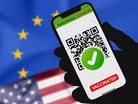Advances in health "must ensure self-sovereign identity"

The UK government has announced that from September onwards COVID-19 vaccine passports will be necessary to gain entry into places with large crowds, such as nightclubs.
This has reignited the debate between those who believe having proof of vaccinations will enable people to gather in public places and travel safely, and those who view the digital certificates as an attack on personal freedom.
The arguments have increased in intensity since the recent announcement to drop COVID-19 restrictions in England, in a move to reopen the economy that has attracted fierce criticism both domestically and overseas.
Cross-party ministers are set to defy the government’s latest plans to introduce vaccine passports over civil liberties concerns. A number of MPs have already signed the Big Brother Watch declaration against “Covid status certification to deny individuals access to general services, businesses or jobs” in recent months.
However Mark Shaw, CEO of Tento Applied Sciences, says the Big Brother Watch campaign is based on false assumptions. “Big Brother Watch puts forward a compelling argument based around civil liberties, but some of the assumptions they make are simply incorrect” he says.
“For example, the BBW campaign claims that all Covid passes are discriminatory, counterproductive and would lead to British citizens having to share personal health information with anyone in authority, from bouncers to bosses. However, there are already privacy-first digital wallets that give individuals the freedom to store and share anonymised medical documents, work credentials and other types of documentation quickly, simply, and securely.
“I wholeheartedly agree that individuals should not be required to share their own personal health information with unknown third parties or with anyone in authority who demands it" Shaw adds. "But I strongly disagree with the suggestion that ‘events and businesses are either safe to open for everyone, or no one’. It creates a false dichotomy that either everyone is safe, or nobody is safe. If employers or event organisers don’t take action to properly manage workplace or venue safety, then they risk curtailing the safety and freedom of movement for the majority."
The subject of personal health data is under scrutiny in the UK at the moment, following controversial plans for the NHS to share patient data with third parties. These have been put on hold following public criticism.
Meanwhile a new report has found that the majority of the British public is willing to embrace digital healthcare tools such as apps and digital therapies prescribed by a trusted healthcare professional.
Shaw adds: “The vital point to make is this: innovations in health technology must ensure self-sovereign identity. This means the data held about an individual is owned by the individual and stored on their device. And, in the case of medical data, that data can be delivered from healthcare professionals to the device in an encrypted format, and the user chooses how they share their information."
- Exploring Africa's Vaccine Manufacturing ChallengesMedical Devices & Pharma
- Tackling the healthcare burnout epidemic: Analytics antidoteTelehealth & COVID-19
- Saving oxygen, saving lives, through COVID-19 at CamconDigital Healthcare
- How women have used telehealth during the pandemicTelehealth & COVID-19



